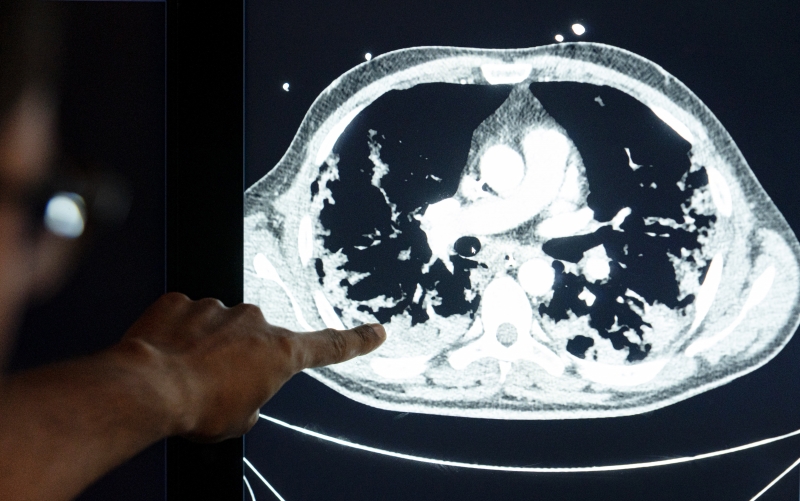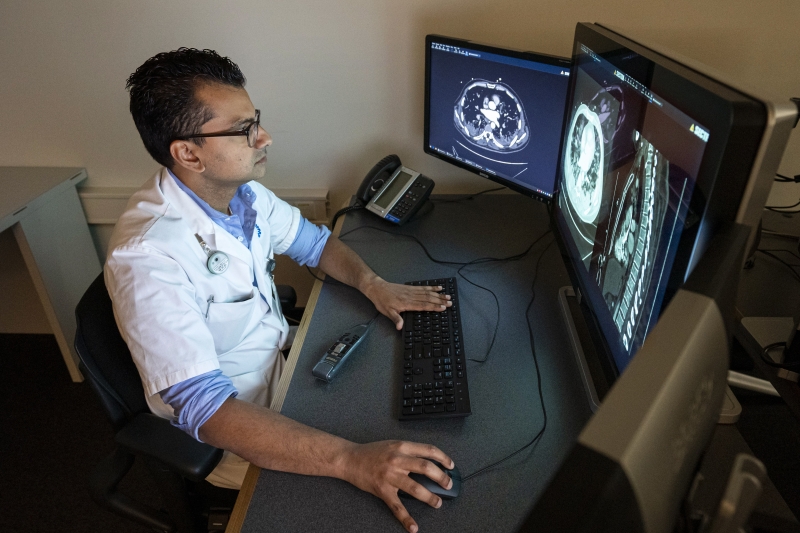Thirona partners with P4O2 consortium to study long-term effects of COVID-19
Public-private consortium P4O2 (Precision Medicine for more Oxygen) investigates risk factors for developing lung damage and chronic complaints after COVID-19
30 September 2020
Many patients who have had COVID-19 continue to have health complaints for a long period of time. The long-term effects of the damage caused by the virus and the body's response to it is unclear. A team of researchers, private parties and patient representatives will investigate how these complaints develop and which factors can predict them in future patients. The project is co-funded by the PPP Allowance made available by Top Sector Life Sciences & Health (Health~Holland).

Abnormalities in the lungs of a COVID-19 patient. Photo: Thijs Rooimans
State-of-the-art measurements in post-corona clinics
Patients who have been admitted to hospital because of COVID-19 and those who consulted their GP after remaining ill for a long time after COVID-19, will be referred to a post-corona clinic where lung function tests, CT scans, questionnaires, and laboratory tests will be performed. For this P4O2-COVID study, additional tests will be performed in middle-aged patients when they visit the clinic approximately 3 and 12 months after their initial recovery from COVID-19.
State-of-the-art measurements and analyzes that are applied within renowned scientific studies will be carried out in the 100 people participating in this study. For example, additional biological samples will be taken to perform various –omics measurements (a method to very extensively map biological and chemical process, for example, gene regulation, metabolism, or bacteria in the body) to gain insight into possible differences in the biological response of patients with long-term complaints. The exposome of these patients will also be mapped. These are environmental and social factors which people experience in daily life, such as chemicals, air pollution, smoking, dietary intake, and physical activity. Participants will receive devices that measure their exposure and physical activity, for example a bracelet that collects substances from the environment.
CT scans, which are part of standard care, will be analyzed using the latest artificial intelligence methods. Thirona will contribute by analyzing chest CT scans of participants for abnormalities with its CAD4COVID and LungQ software solutions.

Radiologist Firdaus Mohamed Hoesein studies CT scans of COVID-19 patients. Photo: Thijs Rooimans
Participants will also be offered an intervention focused on nutrition and physical activity that is expected to have a beneficial effect on quality of life. Furthermore, with the help of experimental cell models, laboratory research will help to identify factors and mechanisms that predict a more serious course of disease. Using big-data analysis, a pattern will be sought in the data that predicts who is susceptible to developing chronic complaints after the disease in future patients.
This research fits the missions of the Top Sector LSH, as there is attention for unhealthy lifestyle and the living environment (mission I) and for care provided to people within their own living environment (mission II). The P4O2-COVID study will reduce the proportion of people with a chronic disease or lifelong disability (mission III).
About the consortium
The P4O2-COVID study will be performed by partners from the P4O2 consortium; this consortium originated from the National Program for Lung Research, which the Netherlands Respiratory Society (NRS) developed together with other lung associations, researchers, healthcare professionals, patients, and companies to generate more attention for lung diseases and to improve cooperation between lung researchers in the Netherlands. Collaboration with industry will promote implementation of the acquired knowledge.
Partners and sponsors of the P4O2 COVID project are Amsterdam UMC, LUMC, UMCG, UMC Utrecht, Utrecht University, Maastricht University and Maastricht UMC+, Boehringer Ingelheim, Breathomix, Fluidda, Novartis, Ortec Logiqcare, Philips, Quantib-U, Smartfish, SODAQ, Thirona, and TopMD. The collaboration project is co-funded by the PPP Allowance made available by Health~Holland, Top Sector Life Sciences & Health, to stimulate public-private partnerships (https://www.health-holland.com). The consortium is led by Prof. Dr. Anke-Hilse Maitland - van der Zee from the Amsterdam UMC, location AMC. More information is available at www.p4o2.org and via nrs@nrs-science.nl